Entry-Level Data Analyst Resume Examples

Jul 18, 2024
|
12 min read
Boost your chances with a sleek, data-driven resume: tips to help you crunch the numbers and get noticed in the job market.
Rated by 348 people
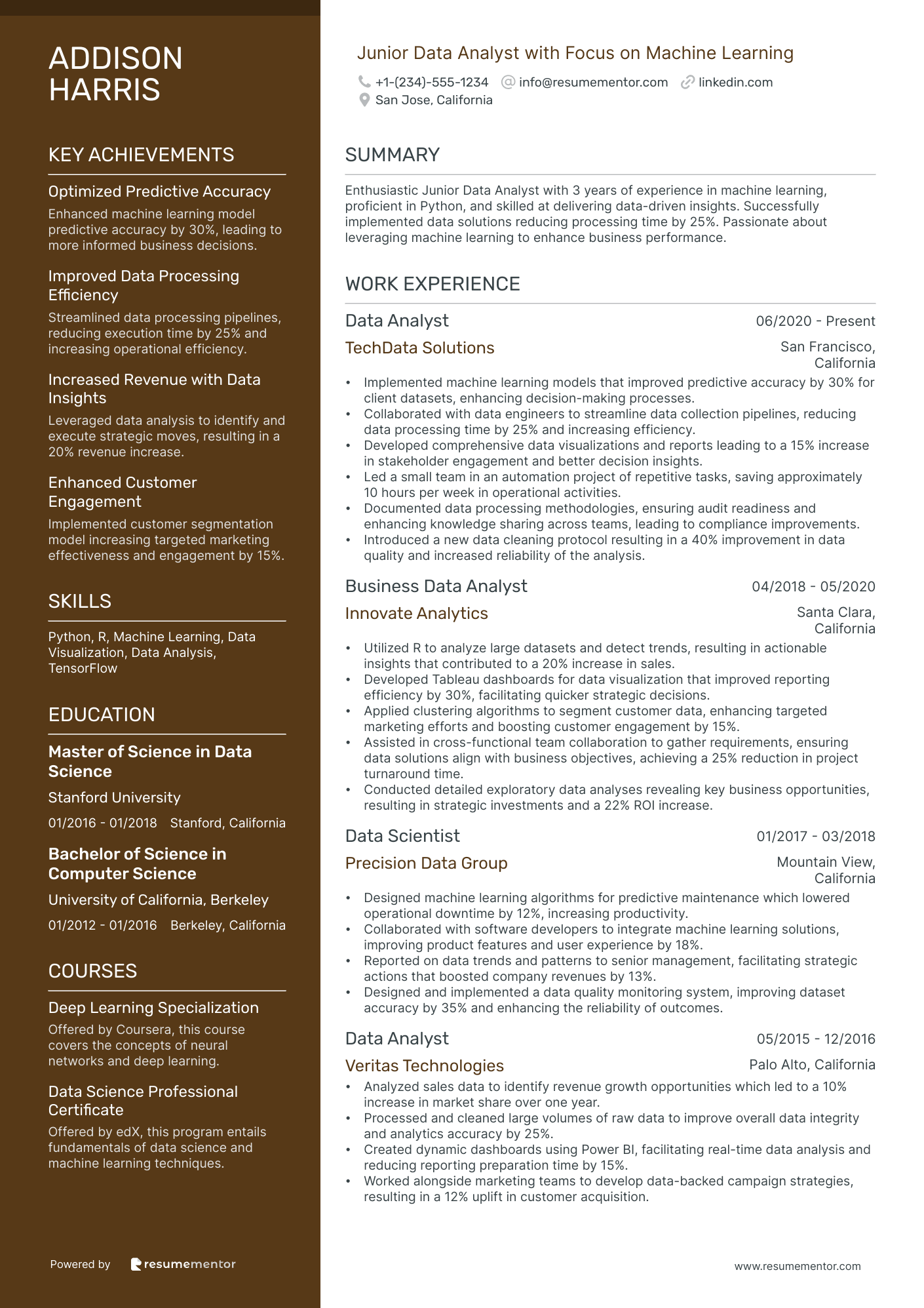
Junior Data Analyst with Focus on Machine Learning
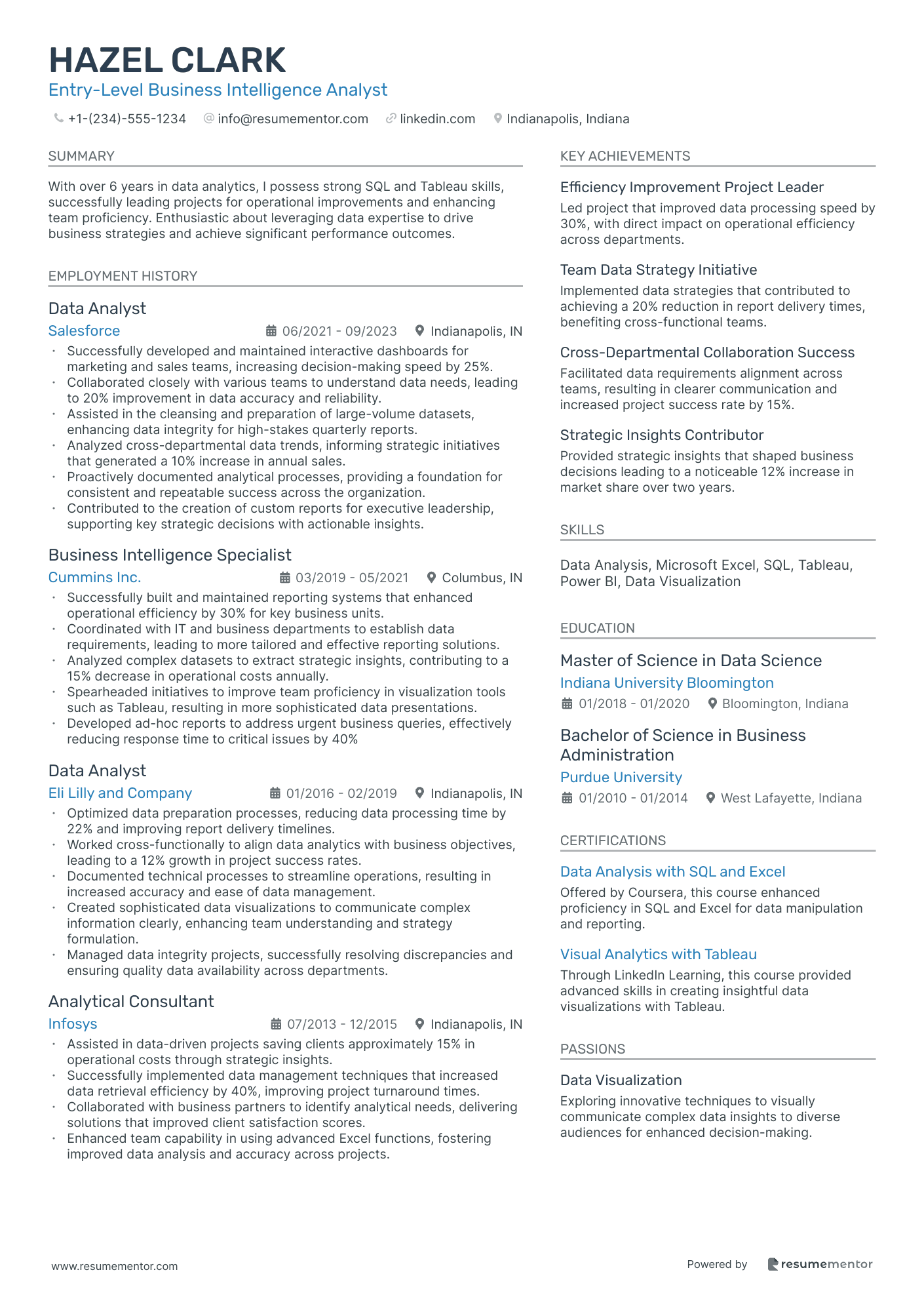
Entry-Level Business Intelligence Analyst
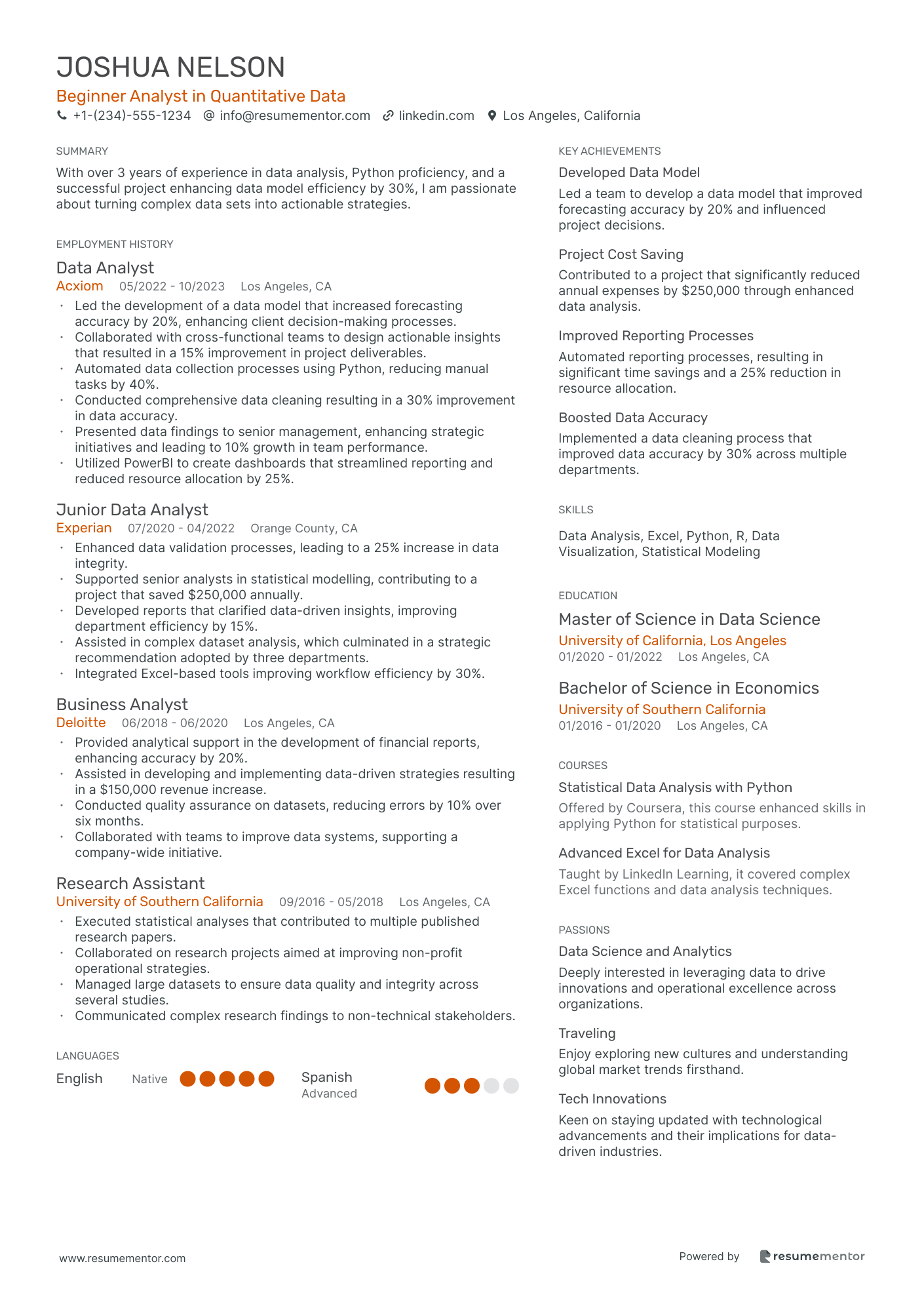
Beginner Analyst in Quantitative Data
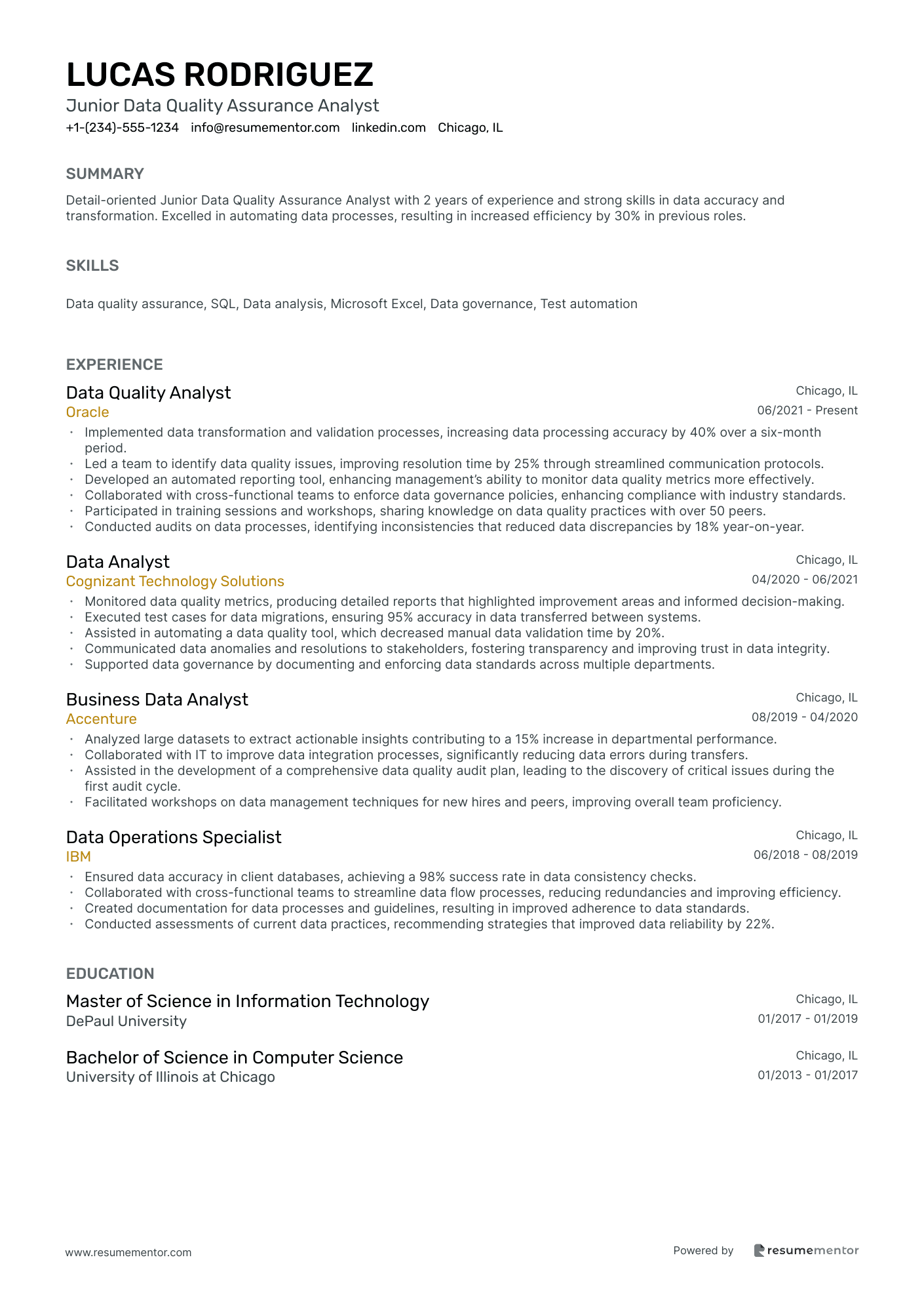
Junior Data Quality Assurance Analyst
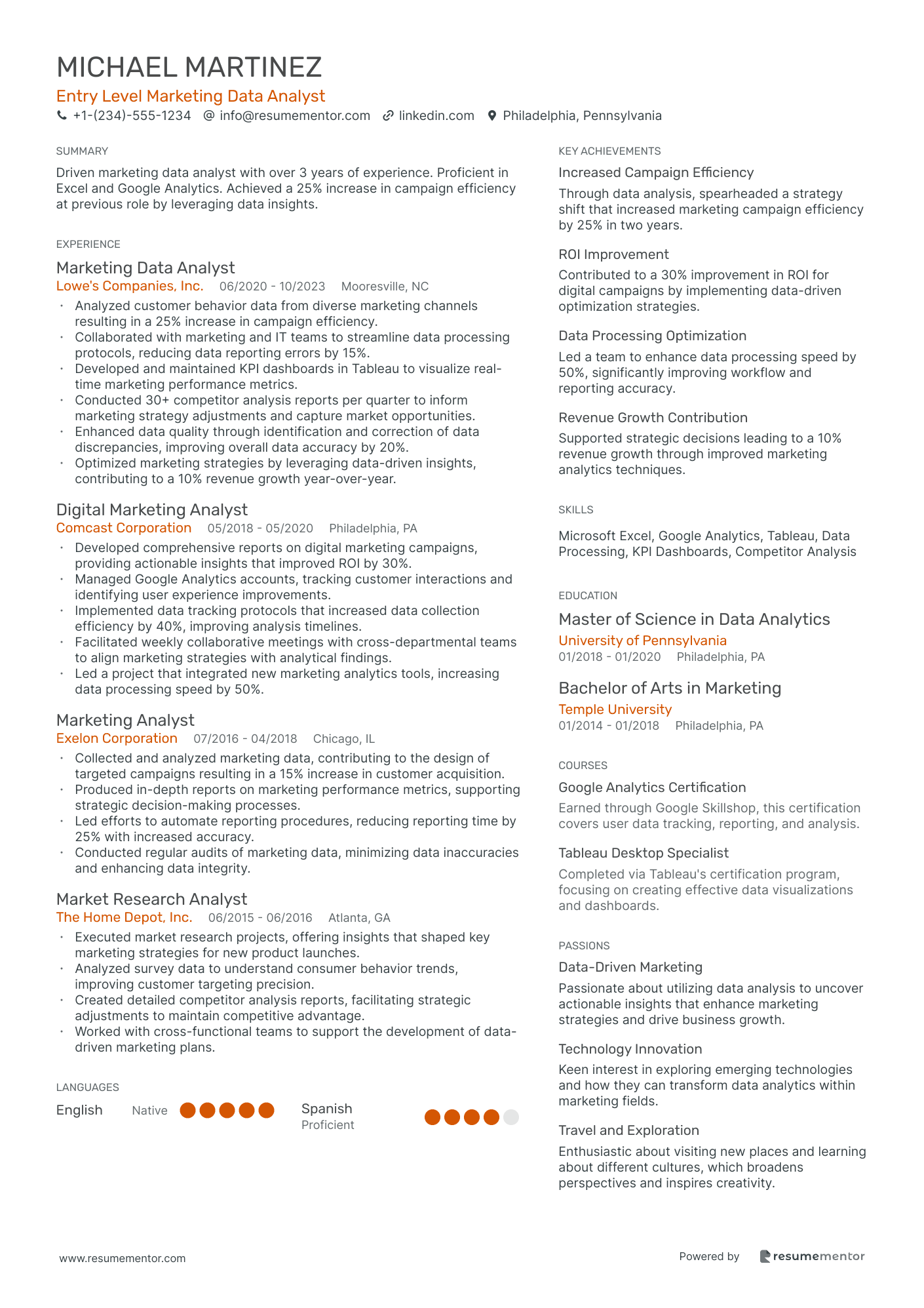
Entry Level Marketing Data Analyst
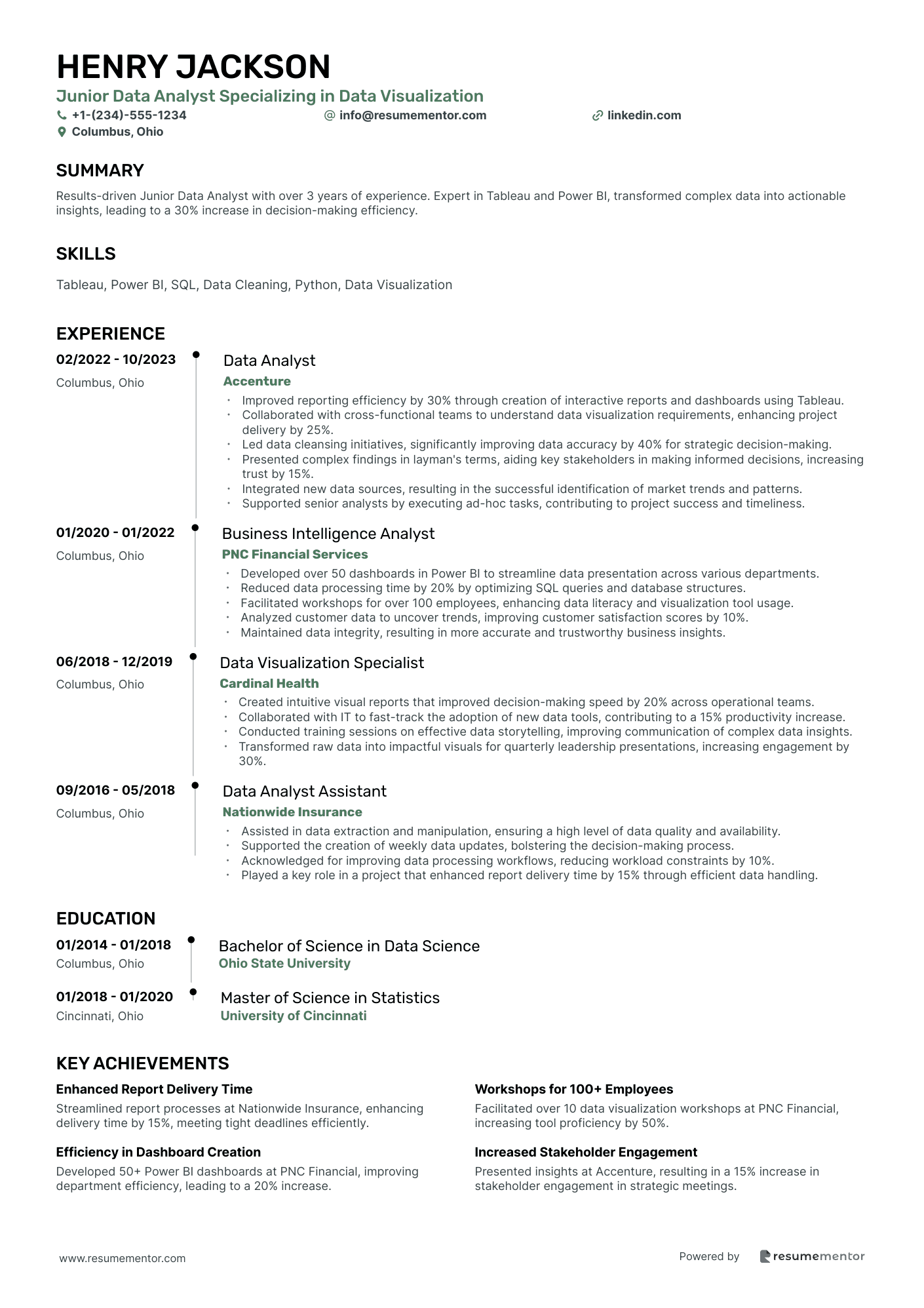
Junior Data Analyst Specializing in Data Visualization
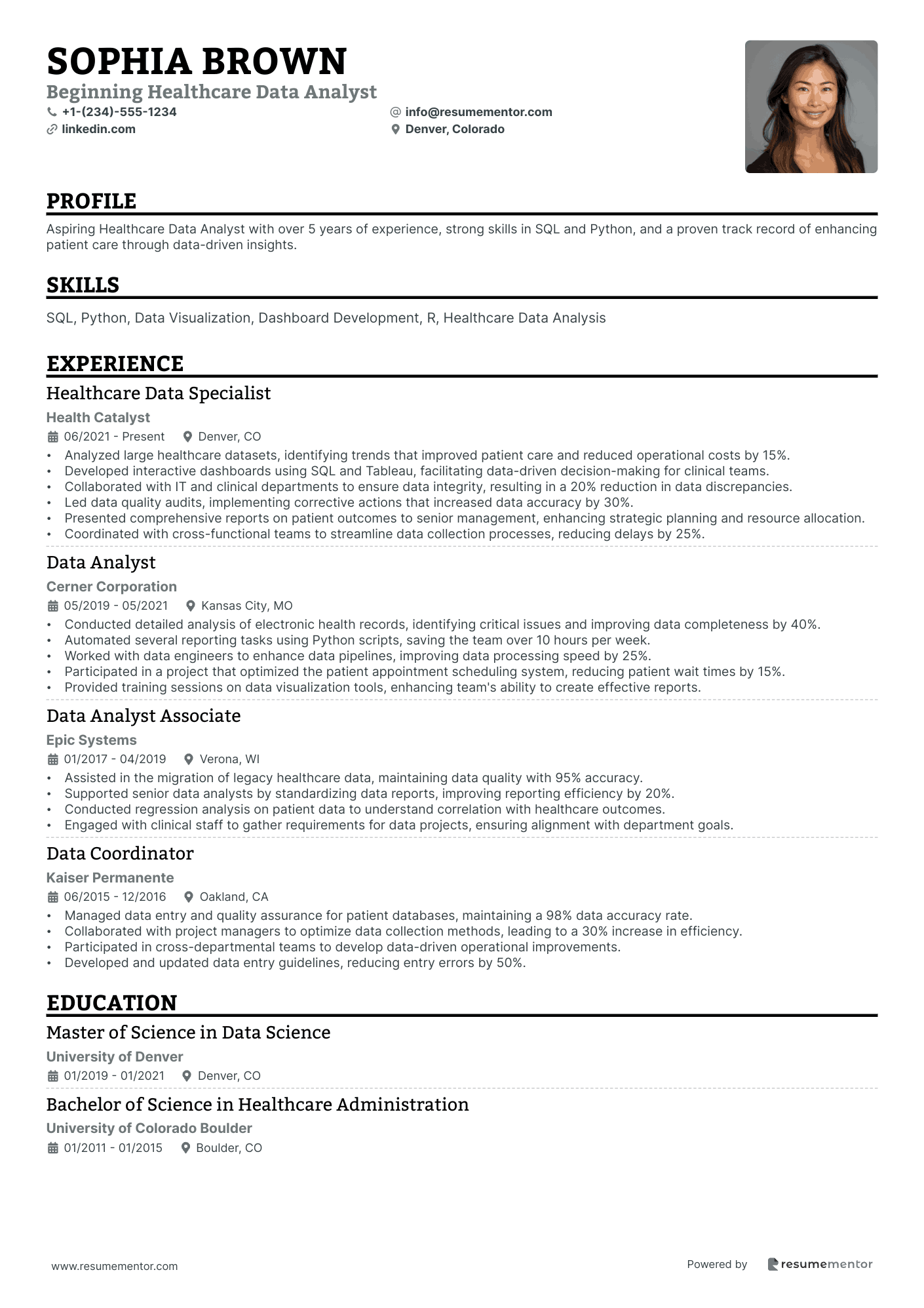
Beginning Healthcare Data Analyst
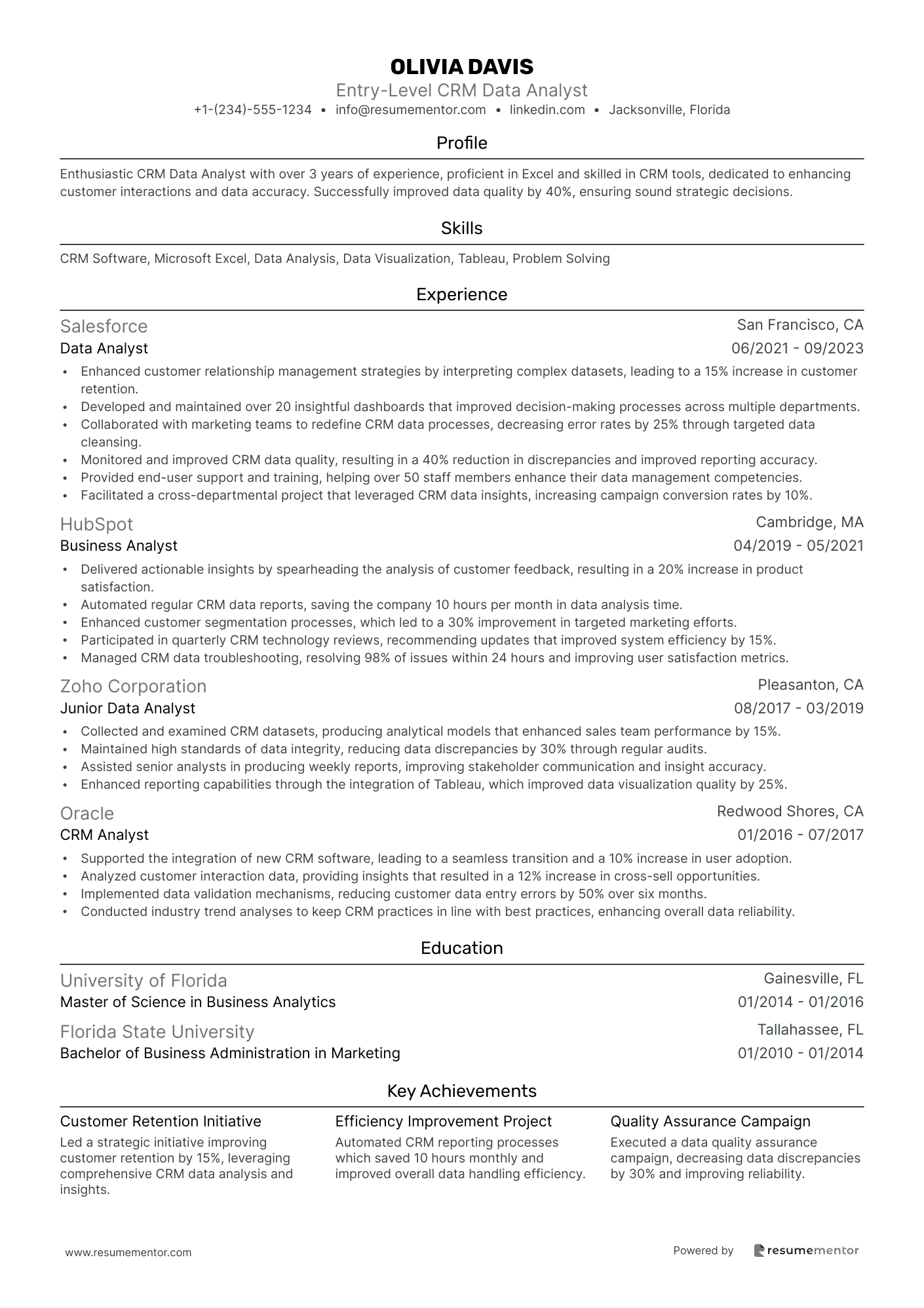
Entry-Level CRM Data Analyst
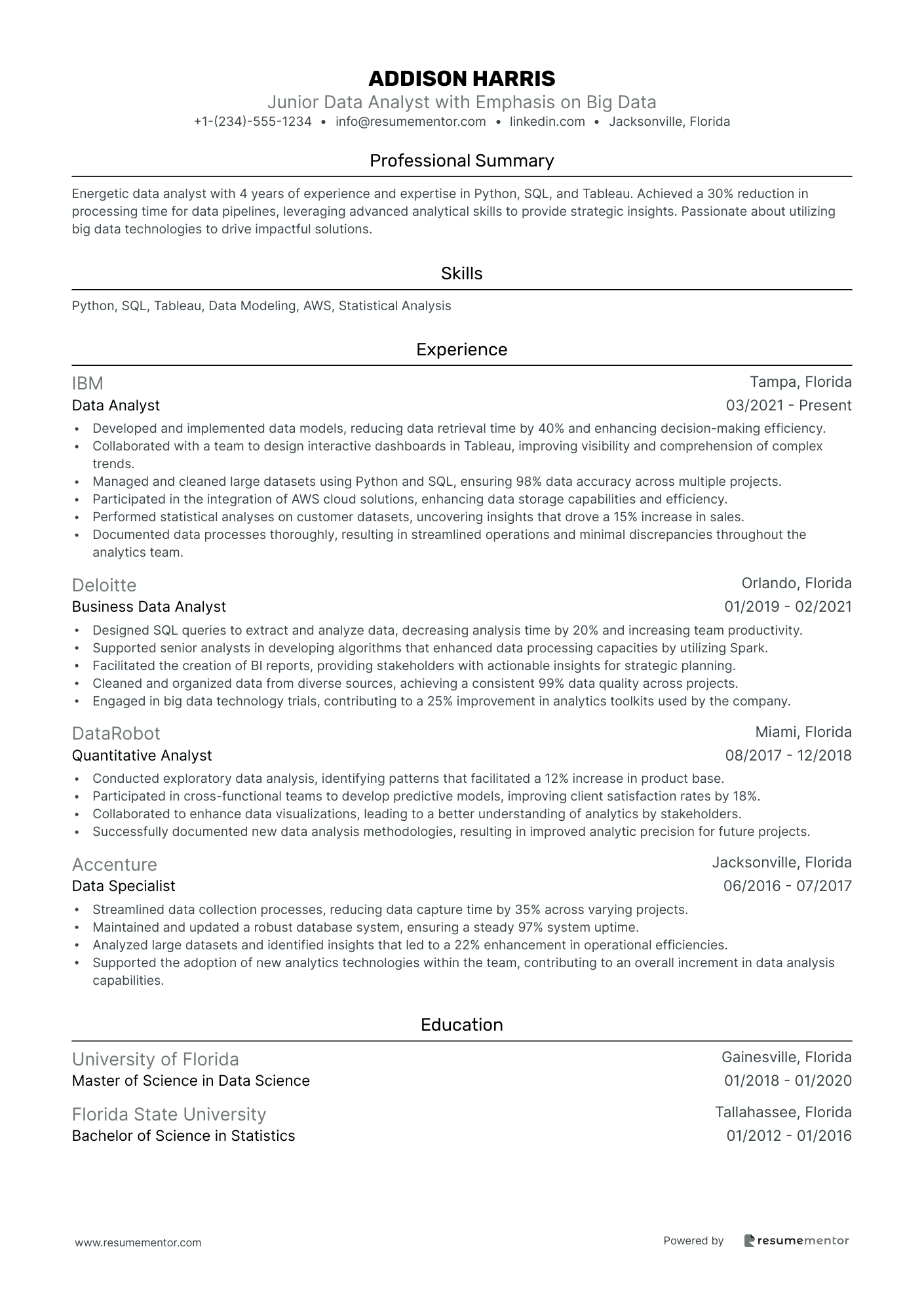
Junior Data Analyst with Emphasis on Big Data

Junior Data Analyst with Focus on Machine Learning resume sample
- •Implemented machine learning models that improved predictive accuracy by 30% for client datasets, enhancing decision-making processes.
- •Collaborated with data engineers to streamline data collection pipelines, reducing data processing time by 25% and increasing efficiency.
- •Developed comprehensive data visualizations and reports leading to a 15% increase in stakeholder engagement and better decision insights.
- •Led a small team in an automation project of repetitive tasks, saving approximately 10 hours per week in operational activities.
- •Documented data processing methodologies, ensuring audit readiness and enhancing knowledge sharing across teams, leading to compliance improvements.
- •Introduced a new data cleaning protocol resulting in a 40% improvement in data quality and increased reliability of the analysis.
- •Utilized R to analyze large datasets and detect trends, resulting in actionable insights that contributed to a 20% increase in sales.
- •Developed Tableau dashboards for data visualization that improved reporting efficiency by 30%, facilitating quicker strategic decisions.
- •Applied clustering algorithms to segment customer data, enhancing targeted marketing efforts and boosting customer engagement by 15%.
- •Assisted in cross-functional team collaboration to gather requirements, ensuring data solutions align with business objectives, achieving a 25% reduction in project turnaround time.
- •Conducted detailed exploratory data analyses revealing key business opportunities, resulting in strategic investments and a 22% ROI increase.
- •Designed machine learning algorithms for predictive maintenance which lowered operational downtime by 12%, increasing productivity.
- •Collaborated with software developers to integrate machine learning solutions, improving product features and user experience by 18%.
- •Reported on data trends and patterns to senior management, facilitating strategic actions that boosted company revenues by 13%.
- •Designed and implemented a data quality monitoring system, improving dataset accuracy by 35% and enhancing the reliability of outcomes.
- •Analyzed sales data to identify revenue growth opportunities which led to a 10% increase in market share over one year.
- •Processed and cleaned large volumes of raw data to improve overall data integrity and analytics accuracy by 25%.
- •Created dynamic dashboards using Power BI, facilitating real-time data analysis and reducing reporting preparation time by 15%.
- •Worked alongside marketing teams to develop data-backed campaign strategies, resulting in a 12% uplift in customer acquisition.
Entry-Level Business Intelligence Analyst resume sample
- •Successfully developed and maintained interactive dashboards for marketing and sales teams, increasing decision-making speed by 25%.
- •Collaborated closely with various teams to understand data needs, leading to 20% improvement in data accuracy and reliability.
- •Assisted in the cleansing and preparation of large-volume datasets, enhancing data integrity for high-stakes quarterly reports.
- •Analyzed cross-departmental data trends, informing strategic initiatives that generated a 10% increase in annual sales.
- •Proactively documented analytical processes, providing a foundation for consistent and repeatable success across the organization.
- •Contributed to the creation of custom reports for executive leadership, supporting key strategic decisions with actionable insights.
- •Successfully built and maintained reporting systems that enhanced operational efficiency by 30% for key business units.
- •Coordinated with IT and business departments to establish data requirements, leading to more tailored and effective reporting solutions.
- •Analyzed complex datasets to extract strategic insights, contributing to a 15% decrease in operational costs annually.
- •Spearheaded initiatives to improve team proficiency in visualization tools such as Tableau, resulting in more sophisticated data presentations.
- •Developed ad-hoc reports to address urgent business queries, effectively reducing response time to critical issues by 40%
- •Optimized data preparation processes, reducing data processing time by 22% and improving report delivery timelines.
- •Worked cross-functionally to align data analytics with business objectives, leading to a 12% growth in project success rates.
- •Documented technical processes to streamline operations, resulting in increased accuracy and ease of data management.
- •Created sophisticated data visualizations to communicate complex information clearly, enhancing team understanding and strategy formulation.
- •Managed data integrity projects, successfully resolving discrepancies and ensuring quality data availability across departments.
- •Assisted in data-driven projects saving clients approximately 15% in operational costs through strategic insights.
- •Successfully implemented data management techniques that increased data retrieval efficiency by 40%, improving project turnaround times.
- •Collaborated with business partners to identify analytical needs, delivering solutions that improved client satisfaction scores.
- •Enhanced team capability in using advanced Excel functions, fostering improved data analysis and accuracy across projects.
Beginner Analyst in Quantitative Data resume sample
- •Led the development of a data model that increased forecasting accuracy by 20%, enhancing client decision-making processes.
- •Collaborated with cross-functional teams to design actionable insights that resulted in a 15% improvement in project deliverables.
- •Automated data collection processes using Python, reducing manual tasks by 40%.
- •Conducted comprehensive data cleaning resulting in a 30% improvement in data accuracy.
- •Presented data findings to senior management, enhancing strategic initiatives and leading to 10% growth in team performance.
- •Utilized PowerBI to create dashboards that streamlined reporting and reduced resource allocation by 25%.
- •Enhanced data validation processes, leading to a 25% increase in data integrity.
- •Supported senior analysts in statistical modelling, contributing to a project that saved $250,000 annually.
- •Developed reports that clarified data-driven insights, improving department efficiency by 15%.
- •Assisted in complex dataset analysis, which culminated in a strategic recommendation adopted by three departments.
- •Integrated Excel-based tools improving workflow efficiency by 30%.
- •Provided analytical support in the development of financial reports, enhancing accuracy by 20%.
- •Assisted in developing and implementing data-driven strategies resulting in a $150,000 revenue increase.
- •Conducted quality assurance on datasets, reducing errors by 10% over six months.
- •Collaborated with teams to improve data systems, supporting a company-wide initiative.
- •Executed statistical analyses that contributed to multiple published research papers.
- •Collaborated on research projects aimed at improving non-profit operational strategies.
- •Managed large datasets to ensure data quality and integrity across several studies.
- •Communicated complex research findings to non-technical stakeholders.
Junior Data Quality Assurance Analyst resume sample
- •Implemented data transformation and validation processes, increasing data processing accuracy by 40% over a six-month period.
- •Led a team to identify data quality issues, improving resolution time by 25% through streamlined communication protocols.
- •Developed an automated reporting tool, enhancing management’s ability to monitor data quality metrics more effectively.
- •Collaborated with cross-functional teams to enforce data governance policies, enhancing compliance with industry standards.
- •Participated in training sessions and workshops, sharing knowledge on data quality practices with over 50 peers.
- •Conducted audits on data processes, identifying inconsistencies that reduced data discrepancies by 18% year-on-year.
- •Monitored data quality metrics, producing detailed reports that highlighted improvement areas and informed decision-making.
- •Executed test cases for data migrations, ensuring 95% accuracy in data transferred between systems.
- •Assisted in automating a data quality tool, which decreased manual data validation time by 20%.
- •Communicated data anomalies and resolutions to stakeholders, fostering transparency and improving trust in data integrity.
- •Supported data governance by documenting and enforcing data standards across multiple departments.
- •Analyzed large datasets to extract actionable insights contributing to a 15% increase in departmental performance.
- •Collaborated with IT to improve data integration processes, significantly reducing data errors during transfers.
- •Assisted in the development of a comprehensive data quality audit plan, leading to the discovery of critical issues during the first audit cycle.
- •Facilitated workshops on data management techniques for new hires and peers, improving overall team proficiency.
- •Ensured data accuracy in client databases, achieving a 98% success rate in data consistency checks.
- •Collaborated with cross-functional teams to streamline data flow processes, reducing redundancies and improving efficiency.
- •Created documentation for data processes and guidelines, resulting in improved adherence to data standards.
- •Conducted assessments of current data practices, recommending strategies that improved data reliability by 22%.
Entry Level Marketing Data Analyst resume sample
- •Analyzed customer behavior data from diverse marketing channels resulting in a 25% increase in campaign efficiency.
- •Collaborated with marketing and IT teams to streamline data processing protocols, reducing data reporting errors by 15%.
- •Developed and maintained KPI dashboards in Tableau to visualize real-time marketing performance metrics.
- •Conducted 30+ competitor analysis reports per quarter to inform marketing strategy adjustments and capture market opportunities.
- •Enhanced data quality through identification and correction of data discrepancies, improving overall data accuracy by 20%.
- •Optimized marketing strategies by leveraging data-driven insights, contributing to a 10% revenue growth year-over-year.
- •Developed comprehensive reports on digital marketing campaigns, providing actionable insights that improved ROI by 30%.
- •Managed Google Analytics accounts, tracking customer interactions and identifying user experience improvements.
- •Implemented data tracking protocols that increased data collection efficiency by 40%, improving analysis timelines.
- •Facilitated weekly collaborative meetings with cross-departmental teams to align marketing strategies with analytical findings.
- •Led a project that integrated new marketing analytics tools, increasing data processing speed by 50%.
- •Collected and analyzed marketing data, contributing to the design of targeted campaigns resulting in a 15% increase in customer acquisition.
- •Produced in-depth reports on marketing performance metrics, supporting strategic decision-making processes.
- •Led efforts to automate reporting procedures, reducing reporting time by 25% with increased accuracy.
- •Conducted regular audits of marketing data, minimizing data inaccuracies and enhancing data integrity.
- •Executed market research projects, offering insights that shaped key marketing strategies for new product launches.
- •Analyzed survey data to understand consumer behavior trends, improving customer targeting precision.
- •Created detailed competitor analysis reports, facilitating strategic adjustments to maintain competitive advantage.
- •Worked with cross-functional teams to support the development of data-driven marketing plans.
Junior Data Analyst Specializing in Data Visualization resume sample
- •Improved reporting efficiency by 30% through creation of interactive reports and dashboards using Tableau.
- •Collaborated with cross-functional teams to understand data visualization requirements, enhancing project delivery by 25%.
- •Led data cleansing initiatives, significantly improving data accuracy by 40% for strategic decision-making.
- •Presented complex findings in layman's terms, aiding key stakeholders in making informed decisions, increasing trust by 15%.
- •Integrated new data sources, resulting in the successful identification of market trends and patterns.
- •Supported senior analysts by executing ad-hoc tasks, contributing to project success and timeliness.
- •Developed over 50 dashboards in Power BI to streamline data presentation across various departments.
- •Reduced data processing time by 20% by optimizing SQL queries and database structures.
- •Facilitated workshops for over 100 employees, enhancing data literacy and visualization tool usage.
- •Analyzed customer data to uncover trends, improving customer satisfaction scores by 10%.
- •Maintained data integrity, resulting in more accurate and trustworthy business insights.
- •Created intuitive visual reports that improved decision-making speed by 20% across operational teams.
- •Collaborated with IT to fast-track the adoption of new data tools, contributing to a 15% productivity increase.
- •Conducted training sessions on effective data storytelling, improving communication of complex data insights.
- •Transformed raw data into impactful visuals for quarterly leadership presentations, increasing engagement by 30%.
- •Assisted in data extraction and manipulation, ensuring a high level of data quality and availability.
- •Supported the creation of weekly data updates, bolstering the decision-making process.
- •Acknowledged for improving data processing workflows, reducing workload constraints by 10%.
- •Played a key role in a project that enhanced report delivery time by 15% through efficient data handling.
Beginning Healthcare Data Analyst resume sample
- •Analyzed large healthcare datasets, identifying trends that improved patient care and reduced operational costs by 15%.
- •Developed interactive dashboards using SQL and Tableau, facilitating data-driven decision-making for clinical teams.
- •Collaborated with IT and clinical departments to ensure data integrity, resulting in a 20% reduction in data discrepancies.
- •Led data quality audits, implementing corrective actions that increased data accuracy by 30%.
- •Presented comprehensive reports on patient outcomes to senior management, enhancing strategic planning and resource allocation.
- •Coordinated with cross-functional teams to streamline data collection processes, reducing delays by 25%.
- •Conducted detailed analysis of electronic health records, identifying critical issues and improving data completeness by 40%.
- •Automated several reporting tasks using Python scripts, saving the team over 10 hours per week.
- •Worked with data engineers to enhance data pipelines, improving data processing speed by 25%.
- •Participated in a project that optimized the patient appointment scheduling system, reducing patient wait times by 15%.
- •Provided training sessions on data visualization tools, enhancing team's ability to create effective reports.
- •Assisted in the migration of legacy healthcare data, maintaining data quality with 95% accuracy.
- •Supported senior data analysts by standardizing data reports, improving reporting efficiency by 20%.
- •Conducted regression analysis on patient data to understand correlation with healthcare outcomes.
- •Engaged with clinical staff to gather requirements for data projects, ensuring alignment with department goals.
- •Managed data entry and quality assurance for patient databases, maintaining a 98% data accuracy rate.
- •Collaborated with project managers to optimize data collection methods, leading to a 30% increase in efficiency.
- •Participated in cross-departmental teams to develop data-driven operational improvements.
- •Developed and updated data entry guidelines, reducing entry errors by 50%.
Entry-Level CRM Data Analyst resume sample
- •Enhanced customer relationship management strategies by interpreting complex datasets, leading to a 15% increase in customer retention.
- •Developed and maintained over 20 insightful dashboards that improved decision-making processes across multiple departments.
- •Collaborated with marketing teams to redefine CRM data processes, decreasing error rates by 25% through targeted data cleansing.
- •Monitored and improved CRM data quality, resulting in a 40% reduction in discrepancies and improved reporting accuracy.
- •Provided end-user support and training, helping over 50 staff members enhance their data management competencies.
- •Facilitated a cross-departmental project that leveraged CRM data insights, increasing campaign conversion rates by 10%.
- •Delivered actionable insights by spearheading the analysis of customer feedback, resulting in a 20% increase in product satisfaction.
- •Automated regular CRM data reports, saving the company 10 hours per month in data analysis time.
- •Enhanced customer segmentation processes, which led to a 30% improvement in targeted marketing efforts.
- •Participated in quarterly CRM technology reviews, recommending updates that improved system efficiency by 15%.
- •Managed CRM data troubleshooting, resolving 98% of issues within 24 hours and improving user satisfaction metrics.
- •Collected and examined CRM datasets, producing analytical models that enhanced sales team performance by 15%.
- •Maintained high standards of data integrity, reducing data discrepancies by 30% through regular audits.
- •Assisted senior analysts in producing weekly reports, improving stakeholder communication and insight accuracy.
- •Enhanced reporting capabilities through the integration of Tableau, which improved data visualization quality by 25%.
- •Supported the integration of new CRM software, leading to a seamless transition and a 10% increase in user adoption.
- •Analyzed customer interaction data, providing insights that resulted in a 12% increase in cross-sell opportunities.
- •Implemented data validation mechanisms, reducing customer data entry errors by 50% over six months.
- •Conducted industry trend analyses to keep CRM practices in line with best practices, enhancing overall data reliability.
Junior Data Analyst with Emphasis on Big Data resume sample
- •Developed and implemented data models, reducing data retrieval time by 40% and enhancing decision-making efficiency.
- •Collaborated with a team to design interactive dashboards in Tableau, improving visibility and comprehension of complex trends.
- •Managed and cleaned large datasets using Python and SQL, ensuring 98% data accuracy across multiple projects.
- •Participated in the integration of AWS cloud solutions, enhancing data storage capabilities and efficiency.
- •Performed statistical analyses on customer datasets, uncovering insights that drove a 15% increase in sales.
- •Documented data processes thoroughly, resulting in streamlined operations and minimal discrepancies throughout the analytics team.
- •Designed SQL queries to extract and analyze data, decreasing analysis time by 20% and increasing team productivity.
- •Supported senior analysts in developing algorithms that enhanced data processing capacities by utilizing Spark.
- •Facilitated the creation of BI reports, providing stakeholders with actionable insights for strategic planning.
- •Cleaned and organized data from diverse sources, achieving a consistent 99% data quality across projects.
- •Engaged in big data technology trials, contributing to a 25% improvement in analytics toolkits used by the company.
- •Conducted exploratory data analysis, identifying patterns that facilitated a 12% increase in product base.
- •Participated in cross-functional teams to develop predictive models, improving client satisfaction rates by 18%.
- •Collaborated to enhance data visualizations, leading to a better understanding of analytics by stakeholders.
- •Successfully documented new data analysis methodologies, resulting in improved analytic precision for future projects.
- •Streamlined data collection processes, reducing data capture time by 35% across varying projects.
- •Maintained and updated a robust database system, ensuring a steady 97% system uptime.
- •Analyzed large datasets and identified insights that led to a 22% enhancement in operational efficiencies.
- •Supported the adoption of new analytics technologies within the team, contributing to an overall increment in data analysis capabilities.
Crafting an eye-catching data analyst resume is like turning complex datasets into a compelling story. As an entry-level data analyst, it can be challenging to convey your value without extensive experience. Your expertise in data interpretation is your strength, and now it's time to translate those skills onto paper in a way that resonates.
Establishing your uniqueness among numerous candidates may feel overwhelming, but a well-structured resume can be your key. A resume template provides an essential framework, guiding you to present your skills and qualifications with clarity and precision. If you're ready to start shaping your resume, these helpful resume templates can lead the way.
In the vast landscape of job opportunities, deciding what to spotlight on your resume can be daunting. You might wrestle with determining which skills matter most or how best to organize your experiences. Yet, with the proper structure, you can clearly showcase your analytical potential and make your value known to employers.
Facing the hurdles of starting your data analyst career can feel isolating, but you're not alone. This guide is here to help you create a resume that highlights your skills and builds your confidence. Prepare to confidently tackle the complexities of job applications and position yourself strategically in the competitive field.
Key Takeaways
- To create a standout data analyst resume, focus on showcasing your analytical skills and education in a clear and structured manner, using a reverse-chronological format for maximum impact.
- Make sure to include quantifiable achievements in your experience section, which demonstrate your ability to contribute to business success, alongside relevant technical skills like proficiency in Python, SQL, and Tableau.
- Your resume should feature a summary that highlights your data analysis tools proficiency, practical experiences like internships, and your passion for turning data into insights, which makes you standout from other candidates.
- Successfully integrating appropriate hard and soft skills into your resume helps you stand out to recruiters, emphasizing your technical abilities and interpersonal skills needed to succeed in data analysis roles.
- Ensure your education section only includes relevant qualifications, focusing on data science degrees or similar fields, and mention honors or GPA if they are strong points that can enhance your application.
What to focus on when writing your entry-level data analyst resume
Your entry-level data analyst resume plays a crucial role in landing your first job in the field. Recruiters look for a clear display of your skills and potential to grow. When you list your contact information, ensure it’s straightforward and professional—a clutter-free entry point sets a positive tone. In your professional summary, aim to encapsulate in a few sentences how your analytical skills have been shaped by education and your passion for data, drawing recruiters in with a narrative that is both concise and compelling.
Your education section follows, demonstrating the academic foundation of your data journey. Highlight specific coursework or projects that align with the skills needed in data analysis, such as statistics or data modeling. This foundation transitions into technical skills, where you specify your proficiency with industry-standard tools like Python, SQL, or Tableau. Emphasizing these skills shows you're ready to tackle real-world challenges with the necessary technical toolkit.
Experience is essential, even if you’re just starting out. Utilize this section to show how past roles—perhaps in unrelated fields—required analytical thinking and problem-solving, illustrating transferable skills. Projects come next, giving you room to describe how you’ve applied your knowledge outside formal work settings. Highlight your approach to tackling data problems, the insights you gathered, and how these projects have prepared you for professional roles.
Consider adding certifications and awards relevant to data analysis to round out your resume, as they offer additional proof of your commitment and capability. This optional information can add a competitive edge, showcasing your dedication to becoming a better data analyst. Below, we will explore each of these sections in more detail, giving you a targeted roadmap to crafting an effective entry-level data analyst resume.
How to structure your entry-level data analyst resume
- Contact Information
- Professional Summary
- Education
- Technical Skills
- Experience
- Projects
Which resume format to choose
Crafting an entry-level data analyst resume involves effectively showcasing your skills and experiences in a way that resonates with hiring managers. Start with the reverse-chronological format, which prioritizes your most recent educational accomplishments and relevant work experiences. This layout not only highlights your qualifications but also aligns well with the expectations of employers in the data analysis field.
Choosing the right font is a subtle yet impactful aspect of your resume. Opt for modern and readable fonts like Rubik, Lato, or Montserrat. These choices help to create a clean and professional look, enhancing readability and ensuring that your information is easily digestible for the reader, which is crucial in making a positive first impression.
The file type is another important consideration. Always save and submit your resume as a PDF. This choice guarantees that your formatting remains stable and consistent across different devices and platforms, ensuring that your resume maintains its polished appearance when viewed by potential employers.
Finally, attention to detail in layout is critical. Set your margins to one inch on all sides to keep your resume looking structured and organized. This spacing not only makes your document visually appealing but also allows you to present your information in an uncluttered manner. Together, these elements work to create a resume that stands out in the competitive field of data analysis, making a compelling case for your candidacy.
How to write a quantifiable resume experience section
Crafting an impressive experience section for your entry-level data analyst resume is crucial for making a strong impression. This section is your chance to highlight the skills you've honed and the impact you've made in previous roles. By focusing on measurable achievements, you can demonstrate your potential to add value. Start with your most recent role and move backward, covering positions from the last ten years unless older ones are more relevant. Align your job titles with data analytics to emphasize your experience in the field. Tailoring your resume using keywords from the job ad helps ensure it resonates with what employers are seeking. Action words like "analyzed," "optimized," and "developed" give your accomplishments more impact, making them stand out.
When you use clear, concise bullet points, your achievements become easy to digest. Begin with your job title, followed by the company name, location, and date range, then dive into your accomplishments. Here's a solid example:
- •Analyzed sales data, boosting department efficiency by 15%.
- •Developed dashboards, cutting report preparation time by 30%.
- •Optimized data processes, improving accuracy by 20%.
- •Worked with marketing to boost social media engagement by 25%.
This experience section effectively underscores your relevant skills and achievements, tailored to an entry-level data analyst position. By showcasing specific, quantifiable successes, you not only highlight your ability to bring value but also ensure your resume speaks directly to what employers need. The straightforward structure means hiring managers can quickly see the relevance of your experience through recent and pertinent roles. Tangible examples of your analytical skills paired with compelling action verbs boost the chance they'll be impressed. By aligning with job-specific keywords, you enhance the likelihood of passing initial screenings, which increases the opportunity for your resume to reach a hiring manager's desk, making them eager to learn more about your potential contributions.
Training and Development Focused resume experience section
A training and development-focused data analyst resume experience section should clearly demonstrate how you can enhance learning processes through data analysis. Start by showcasing your experience in collecting and examining data to assess training program effectiveness. Highlight your ability to utilize tools and methodologies that improve training delivery and comprehension. In your bullet points, provide straightforward descriptions of your roles and achievements that clearly connect with each other.
Provide specific data to illustrate your impact, such as measurable improvements in training program results. Highlight your collaboration and communication across various departments, showing your capability to work effectively in a team. Lastly, align your language with the job description by using similar terminology to demonstrate your understanding of the role’s demands.
Training Data Analyst Intern
Tech Learning Corp
June 2022 - Present
- Analyzed training program data to identify patterns and areas for improvement, increasing participant engagement by 15%.
- Collaborated with multiple departments to develop a data-driven approach to training improvements.
- Utilized statistical software to generate reports that informed decision-making for content enhancements.
- Created visual presentations that emphasized key findings to stakeholders, leading to a 10% increase in training uptake.
Responsibility-Focused resume experience section
A responsibility-focused entry-level data analyst resume experience section should clearly demonstrate your skills and achievements, even if you're just starting your career. Begin by highlighting tasks and projects from internships, volunteer roles, or academic work that showcase your abilities. Use action verbs to start each bullet point and emphasize your contribution, while quantifying your achievements to show measurable impact. This not only highlights your analytical skills but also underscores the positive outcomes of your work.
When listing your experience, be concise yet impactful. Start with your job title, dates, and workplace, then provide bullet points that detail your responsibilities and successes. Each bullet should seamlessly connect to how you used data effectively, from identifying trends to supporting teamwork in implementing solutions. By showcasing the improvements and efficiencies your work brought about, you illustrate your capability to take initiative and deliver significant results, making you an attractive candidate for employers.
Data Analyst Intern
ABC Corporation
June 2021 - August 2021
- Analyzed customer data to spot trends, informing a marketing strategy that boosted engagement by 15%.
- Created weekly sales performance reports using Excel, which provided insights that contributed to a 10% improvement in meeting quarterly targets.
- Streamlined data entry by introducing automation tools, reducing manual entry time by 30% and lowering error rates.
- Worked closely with the IT team to implement data visualization tools, enhancing the presentation of key performance indicators for better decision-making.
Customer-Focused resume experience section
A customer-focused data analyst resume experience section should spotlight experiences where your data insights directly benefited the customer. You can begin by identifying moments when your analytical efforts led to significant improvements in customer satisfaction or outcomes. Make sure to clearly explain your role, the actions you took, and the impact of the results. Utilize action verbs and quantify your accomplishments whenever possible. This approach not only highlights your skills but also demonstrates your ability to collaborate effectively with various teams to enhance customer experiences.
To effectively communicate the skills and qualities valued in a customer-focused data analyst, it's crucial to emphasize your problem-solving abilities, attention to detail, and capacity to present data clearly. Use bullet points to distill complex tasks into concise and easily scannable achievements. Tailor each entry to stress the skills most relevant to the position you're targeting, showing your understanding of the powerful role data plays in driving customer satisfaction and informed decision-making.
Data Analyst Intern
Tech Solutions Corp
June 2021 - August 2023
- Analyzed customer feedback data to identify trends that improved service offerings by 15%.
- Collaborated with marketing and sales teams to develop data insights, increasing customer engagement by 20%.
- Created visual reports using Excel and Tableau, making complex data easy for management to understand.
- Assisted in developing surveys and collecting data to evaluate customer satisfaction.
Innovation-Focused resume experience section
An innovation-focused entry-level data analyst resume experience section should spotlight moments where you applied creative strategies to solve problems or enhance processes. Start by mentioning how you improved data accuracy or devised new models, linking these achievements to the specific methods you used. Explain your approach to each project, detailing the tools you employed and the impact made, which reinforces your problem-solving capabilities and creative thinking. By illustrating your contributions, you’ll help potential employers understand the unique value you bring.
To make this section engaging, aim for clarity and impact in your descriptions. Flow naturally by connecting each achievement with the next, using simple language to communicate your accomplishments. Quantifiable outcomes provide strong evidence of your contributions, demonstrating not just what you did, but how your innovative approach added significant value to the organization or project.
Intern
TechStart Inc.
June 2022 - August 2022
- Developed interactive dashboards using Tableau, reducing reporting time by 40%.
- Automated data cleaning processes, enhancing consistency and accuracy by 25%.
- Collaborated with a cross-functional team to identify key metrics for success.
- Created a predictive model using Python, increasing forecasting accuracy by 15%.
Write your entry-level data analyst resume summary section
An entry-level data analyst-focused resume summary section should make a strong first impression, showcasing your most relevant skills and experiences. This is your chance to describe yourself as someone who can bring value to the employer. Highlight key strengths, like your proficiency with data analysis tools or coursework that aligns with the job. Any internships or projects that demonstrate your practical experience should be included too. For example, consider this resume summary:
This summary captures essential skills and real-world applications, while expressing your enthusiasm for data analysis. Unlike a resume objective that focuses on future career goals, a summary emphasizes what you currently bring to the table. It's different from a resume profile, which mixes elements of a summary and an objective. A summary of qualifications lists skills and achievements in bullet points, offering a quick overview. Each of these sections serves its own purpose, but for entry-level positions, a focused summary can set you apart. By directly communicating your value, it encourages potential employers to learn more about you.
Listing your entry-level data analyst skills on your resume
A skills-focused entry-level data analyst resume should highlight your strengths and abilities in a way that catches an employer's attention. Whether you dedicate a specific section to your skills or weave them into your experience and summary, making them clear is key. Highlighting strengths and soft skills not only demonstrates your personal traits but also showcases how well you work with others. Hard skills, on the other hand, reflect specific technical abilities you’ve gained through training or experience, like mastering data tools and techniques.
These skills and strengths serve as vital keywords in your resume, helping it stand out to both recruiters and applicant tracking systems. By using these keywords effectively, you increase your chances of being found by employers searching for candidates with your expertise.
Here's an example of a standalone skills section using the specified JSON format:
The skills listed in this example are crucial for entry-level roles, presented clearly to make it easy for employers to see your capabilities. Including current and relevant skills like "SQL" and "Python" ensures you're speaking the industry's language. By showing a balance of technical data skills alongside analytical abilities, you communicate readiness to take on a data analyst position.
Best hard skills to feature on your entry-level data analyst resume
For an entry-level data analyst, showcasing hard skills demonstrates how well you handle data and use various technological tools. These skills reveal your ability to transform data into actionable insights for business decisions.
Hard Skills
- SQL
- Python
- R Programming
- Excel
- Data Cleaning
- Data Analysis
- Tableau
- Power BI
- Statistical Analysis
- Data Mining
- Machine Learning Basics
- Data Visualization
- Database Management
- Google Analytics
- ETL Processes
Best soft skills to feature on your entry-level data analyst resume
Highlighting soft skills complements your technical abilities, shining a light on how you collaborate with others, tackle problems, and effectively communicate findings. These soft skills demonstrate your potential to grow and adapt within a company.
Soft Skills
- Communication
- Problem-Solving
- Attention to Detail
- Critical Thinking
- Teamwork
- Adaptability
- Time Management
- Analytical Thinking
- Decision Making
- Creativity
- Initiative
- Organizational Skills
- Interpersonal Skills
- Flexibility
- Patience
How to include your education on your resume
An education section is a key part of any entry-level data analyst resume. It's crucial to tailor this section to the job you're applying for, showcasing only relevant education. Avoid including unrelated degrees that won’t contribute to your candidacy. When listing your degree, be clear about the name of the degree, the institution, and the date range. If your GPA is impressive (generally above 3.5), include it to stand out; otherwise, it's fine to leave it off. If you graduated with honors such as cum laude, you should include this accolade as it highlights your academic excellence.
Here's an example of a poorly structured section:
This example is not ideal for a data analyst position because the degree isn't relevant, and the GPA is not particularly strong, thus not enhancing the candidate's profile.
Now, consider this well-crafted example:
This second example excels because it focuses on a degree that's directly aligned with data analysis. The GPA is strong and worth mentioning to capture potential employers' attention. It's precise and relevant, enhancing the candidate's fit for the role.
In Conclusion
In conclusion, crafting a standout entry-level data analyst resume requires you to harness both your technical and soft skills effectively. By focusing on a well-structured resume template, you can present your data interpretation expertise clearly, ensuring it resonates with potential employers. Your education, technical capabilities, and any hands-on experiences play a crucial role in showcasing your qualifications. Highlighting projects and achievements provides tangible proof of your analytical abilities, which can set you apart in a competitive job market. Additionally, thoughtfully selecting resume formats and focusing on readability ensures your information is not only presented professionally but is also easily digestible by hiring managers. As you tailor your resume to align with job-specific keywords, you improve your chances of passing initial screenings and capturing attention. With a focus on clarity, precision, and showcasing your unique value, your resume can serve as a powerful tool in launching your data analyst career. By strategically displaying your hard and soft skills, you establish a balanced and compelling argument for your candidacy. Remember, your resume is not just a document but a narrative of what you bring to the table, and with a strong resume, you're well-equipped to navigate the complexities of job applications in the data analysis field.
Related Articles

Continue Reading
Check more recommended readings to get the job of your dreams.
Resume
Resources
Tools
© 2026. All rights reserved.
Made with love by people who care.

